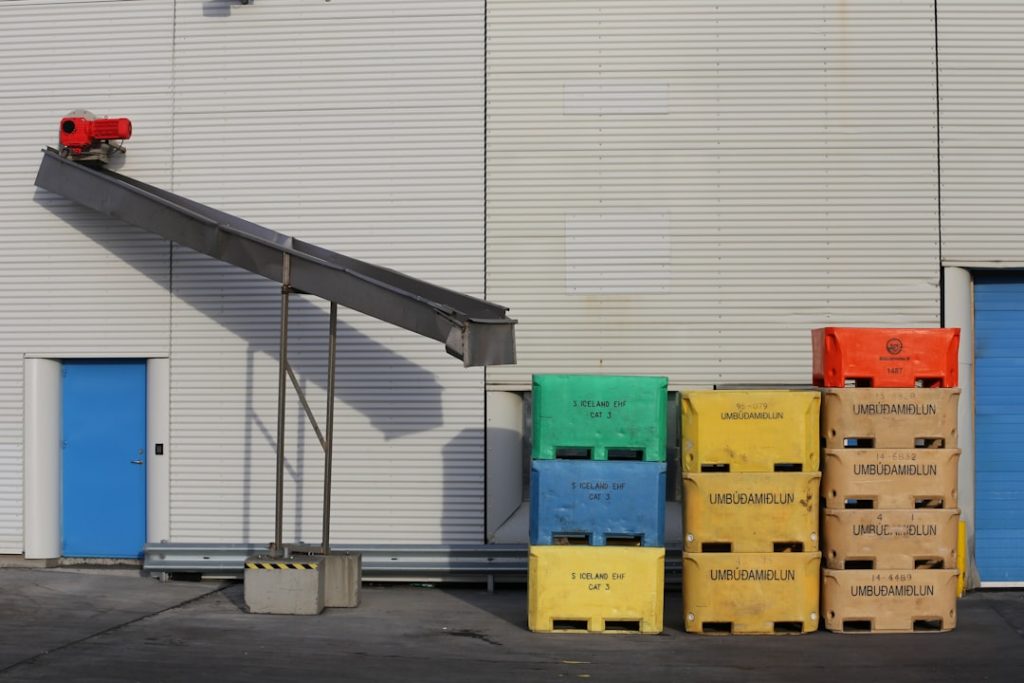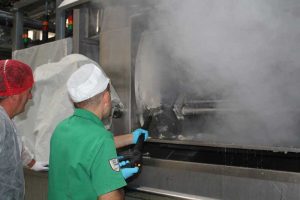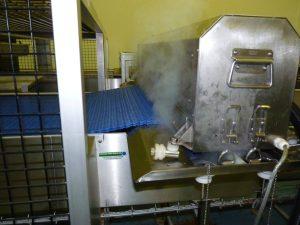Conveyor belt washing machines are a vital component of industrial cleaning processes, particularly in sectors such as food processing, automotive manufacturing and pharmaceutical production. These devices are engineered to efficiently clean and sanitise conveyor belts, which are utilised to transport goods and materials throughout the production process. Conveyor belt washing machines employ a combination of water, detergent and mechanical scrubbing to remove dirt, debris and contaminants from the belts, ensuring they remain hygienic and safe for use in the production environment.
These machines are available in various sizes and configurations to accommodate different types of conveyor belts and production requirements. Conveyor belt washing machines play a crucial role in maintaining the cleanliness and hygiene of production facilities, as well as ensuring the quality and safety of the products being manufactured. By effectively removing contaminants from conveyor belts, these machines help to prevent cross-contamination and the spread of bacteria and pathogens, which is particularly important in industries where hygiene and sanitation are paramount.
Additionally, conveyor belt washing machines can help to extend the lifespan of conveyor belts by preventing the build-up of dirt and debris, which can cause wear and tear over time. Overall, these machines are an essential tool for maintaining a clean and efficient production environment.
Summary
- Conveyor belt washing machines are essential for maintaining cleanliness and hygiene in industrial settings.
- Using conveyor belt washing machines can improve efficiency and productivity in the workplace.
- There are different types of conveyor belt washing machines available, each with its own unique features and benefits.
- Regular cleaning and maintenance of conveyor belt washing machines is crucial for their optimal performance and longevity.
- When choosing a conveyor belt washing machine, it’s important to consider factors such as size, capacity, and specific cleaning requirements.
Benefits of Using Conveyor Belt Washing Machines
Benefits of Conveyor Belt Washing Machines in Industrial Settings
There are numerous benefits to using conveyor belt washing machines in industrial settings. Firstly, these machines help to ensure the cleanliness and hygiene of conveyor belts, which is essential for maintaining the quality and safety of the products being manufactured.
Improved Hygiene and Safety
By removing dirt, debris, and contaminants from the belts, conveyor belt washing machines help to prevent cross-contamination and the spread of bacteria and pathogens, which is particularly important in industries such as food processing and pharmaceutical production.
Reduced Risk of Product Recalls
By ensuring the cleanliness and hygiene of conveyor belts, conveyor belt washing machines help to reduce the risk of product recalls and ensure compliance with industry regulations and standards.
Improved Efficiency
In addition to improving hygiene and safety, conveyor belt washing machines can also help to improve the efficiency of production processes. Clean conveyor belts are less likely to experience jams or malfunctions, which can cause costly downtime and production delays.
Reduced Maintenance Costs
By keeping conveyor belts clean and free from debris, these machines help to ensure smooth and uninterrupted operation, leading to increased productivity and reduced maintenance costs. Furthermore, by extending the lifespan of conveyor belts, washing machines can help to reduce the frequency of belt replacements, saving both time and money in the long run.
Overall Benefits
Overall, the use of conveyor belt washing machines offers significant benefits for industrial operations.
Types of Conveyor Belt Washing Machines

There are several types of conveyor belt washing machines available on the market, each designed to meet specific cleaning requirements and production needs. One common type is the spray washing machine, which uses high-pressure water jets to clean the surface of the conveyor belt. These machines are effective at removing loose debris and contaminants, making them suitable for light to moderate cleaning tasks.
Another type is the immersion washing machine, which submerges the conveyor belt in a tank of water and detergent to thoroughly clean and sanitise the entire belt. This type of machine is ideal for heavy-duty cleaning tasks and is often used in industries with strict hygiene requirements. In addition to these types, there are also modular conveyor belt washing systems that can be customised to fit specific production layouts and cleaning needs.
These systems typically consist of multiple cleaning stages, such as pre-wash, main wash, rinse, and drying, to ensure thorough cleaning and sanitisation of the conveyor belt. Some modular systems also incorporate features such as automatic belt tracking and adjustable water pressure to optimise cleaning performance. Ultimately, the choice of conveyor belt washing machine will depend on factors such as the type of contaminants being removed, the size and speed of the conveyor belt, and the specific requirements of the production process.
Importance of Conveyor Belt Cleaning in Industrial Settings
Conveyor belt cleaning is a critical aspect of maintaining hygiene, safety, and efficiency in industrial settings. Over time, conveyor belts can accumulate dirt, debris, grease, and other contaminants that can compromise product quality and pose health risks. In industries such as food processing and pharmaceutical production, where strict hygiene standards must be met, clean conveyor belts are essential for preventing cross-contamination and ensuring the safety of the products being manufactured.
Additionally, in industries such as automotive manufacturing, clean conveyor belts are necessary for preventing damage to sensitive components and ensuring smooth production processes. Regular cleaning of conveyor belts also helps to extend their lifespan and reduce maintenance costs. Dirt and debris can cause wear and tear on belts over time, leading to premature failure and the need for costly replacements.
By implementing regular cleaning schedules using conveyor belt washing machines, industrial facilities can prevent the build-up of contaminants and prolong the life of their conveyor belts. This not only saves money on replacement costs but also reduces downtime associated with belt maintenance and repairs. Overall, the importance of conveyor belt cleaning in industrial settings cannot be overstated, as it directly impacts product quality, safety, and operational efficiency.
How Conveyor Belt Washing Machines Improve Efficiency
Conveyor belt washing machines play a key role in improving efficiency in industrial settings by ensuring that production processes run smoothly and uninterrupted. Clean conveyor belts are less likely to experience jams or malfunctions caused by dirt or debris build-up, which can lead to costly downtime and production delays. By effectively removing contaminants from conveyor belts, washing machines help to maintain optimal belt performance and prevent issues that can disrupt production.
This ultimately leads to increased productivity and reduced operational costs. In addition to preventing downtime, conveyor belt washing machines also contribute to efficiency by reducing the need for frequent belt replacements. Over time, dirt and debris can cause wear and tear on conveyor belts, leading to premature failure and the need for costly replacements.
By keeping belts clean and free from contaminants, washing machines help to extend their lifespan, reducing the frequency of replacements and saving both time and money in the long run. Furthermore, clean conveyor belts contribute to overall operational efficiency by ensuring product quality and safety. By preventing cross-contamination and the spread of bacteria and pathogens, washing machines help to maintain high standards of hygiene in industrial settings, ensuring that products meet regulatory requirements and consumer expectations.
Considerations for Choosing the Right Conveyor Belt Washing Machine

Here is the rewritten text in British English with **Choosing the Right Conveyor Belt Washing Machine for Industrial Use**
When selecting a conveyor belt washing machine for industrial use, there are several key considerations to take into account. Firstly, it is essential to consider the specific cleaning requirements of the production process. Different types of contaminants may require different cleaning methods, so it is important to choose a machine that is capable of effectively removing the specific types of dirt or debris present on the conveyor belts.
**Factors to Consider**
In addition to the type of contaminants present, the belt size, speed, and material of the conveyor belt washing machine must also be considered to ensure compatibility with existing production equipment.
**Automation Level**
Some conveyor belt washing machines offer fully automated cleaning cycles with programmable settings for different types of belts or contaminants. This level of automation can help to streamline cleaning processes and reduce labour costs associated with manual cleaning methods.
**Additional Considerations**
Furthermore, factors such as water consumption, energy efficiency, and maintenance requirements must also be considered when choosing a washing machine to ensure that it aligns with sustainability goals and operational needs.
I hope this helps!
Maintenance and Care of Conveyor Belt Washing Machines
Proper maintenance and care are essential for ensuring the long-term performance and reliability of conveyor belt washing machines in industrial settings. Regular maintenance tasks such as cleaning filters, inspecting nozzles, and lubricating moving parts should be carried out according to manufacturer recommendations to prevent issues such as clogging or component wear. Additionally, it is important to monitor water quality and detergent levels to ensure effective cleaning performance while minimising environmental impact.
Furthermore, regular inspections should be conducted to identify any signs of wear or damage that may affect the performance of the machine. Any worn or damaged components should be promptly replaced to prevent further issues that could lead to costly repairs or downtime. Finally, proper training should be provided to operators responsible for using conveyor belt washing machines to ensure that they understand how to operate the machine safely and effectively.
By implementing a comprehensive maintenance plan and providing adequate training, industrial facilities can maximise the lifespan and performance of their conveyor belt washing machines while minimising operational disruptions.
FAQs
What is a conveyor belt washing machine?
A conveyor belt washing machine is a piece of industrial equipment designed to clean and sanitize conveyor belts in manufacturing and processing facilities. It uses a combination of water, detergent, and mechanical scrubbing to remove dirt, debris, and contaminants from the belt surface.
What are the benefits of using a conveyor belt washing machine?
Using a conveyor belt washing machine helps to maintain a clean and hygienic production environment, reduces the risk of product contamination, and extends the lifespan of conveyor belts. It also improves overall efficiency by preventing equipment downtime and reducing the need for manual cleaning.
How does a conveyor belt washing machine work?
A conveyor belt washing machine typically consists of a conveyor system that moves the belt through a series of cleaning stages. These stages may include pre-rinsing, washing with detergent, scrubbing with brushes or high-pressure nozzles, rinsing, and drying. The machine can be customized to suit the specific cleaning requirements of different industries.
What industries use conveyor belt washing machines?
Conveyor belt washing machines are used in a wide range of industries, including food and beverage processing, pharmaceuticals, automotive manufacturing, packaging, and more. Any industry that relies on conveyor belts for production can benefit from the use of these machines to maintain cleanliness and hygiene standards.
Are there different types of conveyor belt washing machines?
Yes, there are different types of conveyor belt washing machines available, including manual, semi-automatic, and fully automatic models. The choice of machine depends on the specific cleaning needs, production volume, and level of automation required by the industry.










